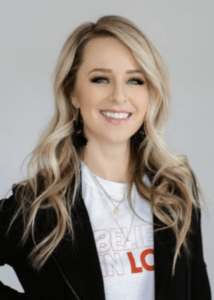Americans worried about border security should look beyond the popular-but-false portrayal of migrants as invaders and seek ways to help those in troubled nations not need to become immigrants in the first place.
That’s the message of two evangelical leaders of refugee ministries who spoke together on a recent Facebook Live webinar titled “Haitian Migrant Crisis at the Border.”
“The reality is that people from around the world are coming to the U.S.-Mexico border because they are driven by political instability, corruption, natural disasters and economic need in increasing numbers, and Americans are concerned,” said Women of Welcome Director Bri Stensrud.

Bri Stensrud
She spoke at the event with Matthew Soerens, U.S. director of church mobilization for World Relief. The online event opened with a discussion of the sudden spike earlier this month of migrants at the border town of Del Rio, Texas, where at least 10,000 immigrants, many of them Haitians, sought to cross into the U.S. in the period of a few days.
What happened at Del Rio?
The size of the crowd, the suddenness of the surge and the dramatic nature of arrests by Border Patrol agents sparked world headlines and renewed claims by some that migrants are trying to overwhelm the United States.
“We’re hearing the all-too-familiar narratives from cable news and partisan pundits that describe migration and all that’s happening right now as an invasion of the United States that is happening as the result of open-border policies from the current administration,” Stensrud said.
Soerens agreed and explained that much of the reaction to the Del Rio event mischaracterized the nature of the crisis it represents.

Matt Soerens
“It is a crisis, but it is a humanitarian crisis,” he said. “That’s different from a security crisis. There are lot of families who have come out of desperate circumstances. That’s why they are trying to seek opportunity and hope, and in some cases protection, in the United States. But that’s different than a security crisis where people are coming in with the intention to do harm and that sort of thing.”
Stensrud said the narratives of invasion and of an unprotected border are flat-out wrong. “Nor are they helpful for the kind of conversation we need to be having about immigration in this country.”
Instead, the dialogue should focus on the systemic drivers of migration — the factors that lead people in other countries to seek refuge in the U.S., she said. Discerning the impact of American foreign policy and other “historical and regional” factors is “important to understanding what are … the pull factors.”
Where did these Haitians come from?
The Del Rio surge also drew a lot of attention because it involved mostly Haitians and because it occurred at a spot on the border unaccustomed to large numbers of migrants, Soerens explained.
U.S. Customs and Border Protection announced the weeklong closure of the Del Rio Port of Entry to passenger and commercial traffic on Sept. 17 as it brought in more agents to process the sudden rise in migrants seeking entry.
“This temporary closure and shift is necessary in order for CBP to respond to urgent safety and security needs presented by an influx of migrants into Del Rio and is effective immediately,” the federal agency said. “It will advance and protect national interests and help ensure the safety of the traveling public, commercial traffic, and CBP employees and facilities.”
“It’s a country that has suffered incredibly, and that’s why it’s important to keep in mind that each of these individuals is a person made in the image of God, and who God loves.”
A similar surge at larger ports of entry may not have drawn as much attention or so greatly taxed local resources, Soerens said. “That’s part of the challenge. In other parts of the U.S. and Mexico, there is more capacity, both governmental and non-governmental — and in terms of churches and ministries — that are used to significant numbers of people showing up and requesting asylum.”
Most of the Haitians who tried to enter the U.S. at Del Rio this month had been living for years as migrants in Central and South American nations, where they had gone to flee intense poverty, political instability and natural disasters, he said. Hurricane Matthew in 2016 and the 2010 earthquake that killed an estimated 200,000 people motivated many to leave Haiti.
“It’s a country that has suffered incredibly, and that’s why it’s important to keep in mind that each of these individuals is a person made in the image of God, and who God loves,” he said.
Biden administration still relying on Title 42
The kind of asylum status the Haitians were seeking requires them to prove a credible fear of persecution in their home country to attain safe haven. And U.S. law requires migrants requesting such asylum be granted temporary status while awaiting hearings.
But the U.S. has been expelling some of the migrants using a federal health code provision called Title 42. While a federal court blocked the government from using the rule on Sept. 16, that court order does not take effect for 14 days.
“With this crisis in Del Rio, they are using Title 42 to expel a significant number of people,” Soerens said of the Biden administration.
But the government also has been allowing some to enter the U.S. to await asylum hearings, creating confusion and renewing calls for Congress to establish a coherent immigration policy.
“Whether it’s Haitians or Cubans or Central Americans or whoever, we need due process and access to asylum laws.”
“Our view is everyone should be given due process. It doesn’t mean everyone gets to stay, but everyone gets to avail themselves of the protections offered by U.S. law,” Soerens said. “Whether it’s Haitians or Cubans or Central Americans or whoever, we need due process and access to asylum laws.”
Among the beneficiaries of the United States’ confusing immigration system are those who prey on immigrants, Stensrud added. “We are giving cartels and smugglers and those who would take advantage of migrants an opportunity to get wealthy and to take advantage of more people.”
Seeking systemic change
Part of the solution, she said, is to press members of Congress for fair immigration legislation and for churches and individuals to give to ministries that operate on the border.
But another part is to explore ways of contributing to systemic change, she added, including through organizations like World Relief. “We will see more Haitians at the border unless we get involved in that country, and that’s the same in Central America and in all of these places. We are seeing this flood of people partly because there is instability in-country.”
Soerens said the church in Haiti is organized, motivated and vibrant and ready to partner with outside organizations that can provide resources for recovery to the recent earthquake and other pressing issues: “There are a lot of challenges, but there is also a lot of resilience and a lot of strength and a lot of creativity.”
Related articles:
She’s pro-life and pro-immigrant and trying to bring other evangelical women along
We cannot now close our border to those fleeing the horror we helped create | Opinion by Chris Conley
Pressure mounts on White House to rescind another Trump immigration policy


